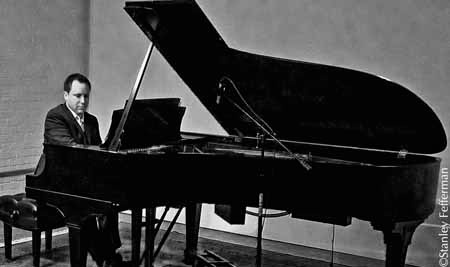November 1, 2012. Jane Mallett Theatre, Toronto.
Pianist-composer Adam Sherkin put together a challenging program for the opening recital of his Toronto season: four compositions by established composers in transition, and one of his own recent works, German Promises (2011). Transitions are difficult—the pieces Sherkin played were not easy—but the commitment and consistent excellence of his playing made this a quality listening experience.
Sherkin grouped his selections under the title Plastic Dawn to signify that life situations are malleable, can be shaped by imagination to bring light and promise into our lives, even in difficult circumstances.
Samuel Barber wrote Ballade, Op. 46, his last work for piano, in 1977 at the onset of a mortal illness. He struggled for a year to fulfill a commission for this 7 ½ minutes of music. Ballade is a three-part piece in a form usually reserved for lighter moods. It explores emotional extremes from anxiety, through anger and anguish, to grief. Sherkin’s treatment of the neo-Romantic temper of the work is appropriately contrasty, bringing out its colour, drama, and lyricism. He has a fine touch, modulating thoughtfully throughout from “forte” (perhaps a bit too forceful at the opening) to “piano.”
Chopin wrote the Impromptu in F-sharp, Op. 36 (1839) as his life was being taken over by serious illness, debilitating travels, and a domineering lover— Georges Sand. Following without a break on the Barber, the Impromptu’s flowing, lyrical lines lifted this evening’s mood. During the flamboyant second section’s percussive passages, Sherkin impressed with his good sense of time, and with his legato as Choipn’s long melodic line leaps forward, dissolves, and sprints in trills towards the coda.
Aaron Copland took two years to write Piano Fantasy (1955-1957). The challenge, in his own words, was to remould his reputation, to get past “a tendency in recent years to typecast me as primarily a purveyor of Americana in music. ”
Copland’s largest and most ambitious piano work is a half-hour, continuous one-movement piece with elements of both twelve-tone method and normally expressive tonal music. It moves freely, making up its form as it goes, like a ‘fantasy’, like the free-verse experimental poetic narratives of Ezra Pound and William Carlos Williams.
It opens boldly, with a craggy sequence of dark,”clangourous,” chords that Sherkin sustains using the right pedal. He ably structures the sequences that follow, some flowing softly, others rumbling into (“White”) jazz riffs, over brooding crescendos that drift like pealing bells into a Debussyesque elegance of vague forms and muted colours. The creativity of composer and performer is quite thrilling. Some violent and hallucinatory passages follow in a multi-voiced chrous that Sherkin makes lucid. The slower ideas of the first section recur and the work ends in the crystalline trilling of bells that fade into a significant silence.
Schumann composed his Songs of Dawn, Op.133 (1854) around the time of his attempted suicide and incarceration in the asylum where he died. The five “Songs” are lyrical, but reach out towards the borders of reality to express his inner dissonance. Schumann’s ideas tend to congregate around the middle and deep end of the keyboard, flowing away from legato into jagged, snappy, lines. The fourth song though quick, and light, somehow touches feelings of intense longing, sadness and a self-preserving urge to cheer oneself up. Light in the final song flows richly, clear and bright along intricate musical lines.
Adam Sherkin says that his German Promises (2011)—a short, five part study of Germany’s contribution to musical culture—expresses both exhilaration and disillusion. His opening musical argument is elaborate, high in the right hand, repeating series of bell-like tones and figures. Series of slower chords follow in the bass, with crystalline notes in the right sounding like mocking echoes of Romantics like Chopin, Schumann, and Leonard Bernstein. A long silence is succeeded by echoes of Philip Glass and the hammering of dark chords that bring to mind Beethoven. The piece gains tremendous momentum through bass runs that usher in our own world with its traffic on roads, in high velocity particle accelerators, mass production lines, and the relentless STAMP of mechanical forces that shape our ends. The final, long sustained note is ambiguous.
Adam Sherkin’s debut album As At First will drop later in the month on the Centredisques label.

